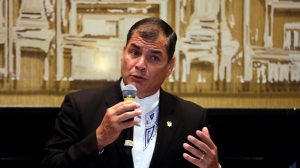Latin America Advisor
A Daily Publication of The Dialogue
How Should Oil Exporters Diversify Their Economies?

Ecuadorean President Rafael Correa said Sept. 14 that the country’s economy may see no growth this year because of the drop in global oil prices, which has stalled investment in the Andean nation. What should oil-exporting countries in Latin America do in order to fortify their economies against the variability of the oil market? What industries should these countries’ leaders develop in order to diversify their economies? Have any countries in the region been particularly successful at diversifying their economies?
Claudio Loser, senior fellow at the Inter-American Dialogue, president of Centennial Group Latin America and former head of the Western Hemisphere Department of the International Monetary Fund: "Latin America’s 100-year experience is full of two types of events: First, serious economic problems associated with fluctuating commodity prices because of a heavy dependence on these exports; and second, failed attempts to diversify, because of the heavy emphasis on industrial protection. Latin America has the fortune—and misfortune—of an amazing availability of natural resources. The region should continue to rely on them, but it should do so intelligently. Every time commodity prices go up, Latin American politicians and policy and opinion makers declare that it is the beginning of a new era, where prosperity will continue, if not forever, for long. They are always proven wrong. Then they talk about new sources of growth, but forget that this requires opening up, integrating effectively with neighbors and other countries, and that they always want to choose winners, which is in fact an impossible task. There are very few contrarian examples. Among those that diversified successfully, Mexico shines. Helped by its size and neighbors—the United States and Canada—the country opened up, became integrated into their markets, and saw a shrinking oil dependence, although not perfect. Others, like Brazil, looked too much inside, with limited success. A second shining example is Chile, which set up a structural budget and has had the discipline to save in good times, and use that money over the cycle, providing a reasonable degree of stability. Surprisingly, Bolivia has followed in those steps. Other countries, full of slogans and unrealistic hopes, seem incapable of learning these simple lessons."
Orazio J. Bellettini Cedeño, executive director and founder of Grupo FARO: "Four commodities (crude oil, bananas, flowers and shrimp) still represent 80 percent of Ecuadorean exports. In addition, little value is added to the country’s economy through research and innovation. Ecuador controls about 32 percent of the world banana trade, but since a boom in production in 1948, has only been able to create about 3 percent added value. This happens, at least partially, because Ecuador invests only 0.35 percent of its GDP on research and development. In addition, universities and private companies do not collaborate and lack a tradition of doing applied research. The Ecuadorean government has been implementing several industrial policies to diversify the economy. One of the most important is Yachay, a city of knowledge anchored by a university and private companies. One of Yachay’s main focuses is to conduct research and technological development around natural resources to develop sectors like nanotechnology and biotechnology. Those sectors, however, demand high levels of capital, which makes it hard to imagine how this will benefit small and medium producers. In addition, the Yachay model tends to replicate the expert-center model of knowledge generation, an ‘ivory tower’ distant from society. For Ecuador to become a natural knowledge economy, it is crucial to value the knowledge that exists in individuals and communities which, for centuries, have managed natural resources, and combine it with scientific knowledge to unleash innovation in sectors like renewable energies, agroindustry and industrial ecology. Countries are more innovative when they promote more collaboration. So for Yachay to be successful, establish a more diversified economy, and promote a more sustainable and inclusive society it has to create a network of universities, private sector, public institutions and civil society, both nationally and abroad, while unleashing people’s creativity for adding value to natural resources."
Francisco X. Swett, chairman of Pallas Management Corp. and former Ecuadorean minister of finance, member of Congress and central bank president: "Knowledge of economics is not a requirement to understand that if you live beyond your means and depend on an uncertain income to make a living, you are bound to hit the wall. This is what has happened to the government of Ecuador whose leader, a trained economist, thrived on high-priced oil and went a long way to turn the economy into a showcase of 21st century socialism. Although each country’s particulars differ, the weaning process away from resource dependence is always belabored. That is the reason why good policy should always hedge in favor of risk diversification, including the ways and means of achieving sustainability. In Ecuador, the government proclaims the need for a new ‘production matrix,’ an idea grounded on substantial heavy-industry projects including a new oil refinery, petrochemical complex, iron works, shipyards and motorways. It is a monumental daydreaming experiment based on poor macroeconomics (the effect on the current account could be devastating); little understanding of international markets; disregard for comparative advantage; and total ignorance of what it takes to be competitive. Getting out of a crisis requires not only putting the fiscal house in order. Long-term success requires abiding by the rule of law and providing legal security, showing respect for the separation of powers, giving the market a chance, drawing the lines of government action, becoming fully integrated into the world community, empowering the people and abandoning the style of confrontation. Nation building can be a mirage if there is no conviction of what it takes to become a modern, free society."
The Latin America Advisor features Q&A from leaders in politics, economics, and finance every business day. It is available to members of the Dialogue's Corporate Program and others by subscription.



















